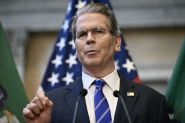
The cabinet session on Hezbollah’s weapons is expected to shape the Arab and international reaction toward Lebanon.
All eyes are on the Lebanese Cabinet session scheduled for next Tuesday, which will address the issue of “disarming Hezbollah,” a phrase used by President Joseph Aoun in his speech on Thursday, Army Day’s eve.
According to sources, Washington is awaiting the outcome of this session before determining its next steps toward Lebanon. US Ambassador Lisa Johnson has reportedly informed Lebanese officials that American envoys, notably Tom Barrack, will suspend their visits to Lebanon until the Lebanese government takes a concrete stance on Hezbollah’s weapons.
Official Lebanese sources say President Joseph Aoun, Prime Minister Nawaf Salam and Foreign Minister Youssef Raji are aligned on having the Cabinet issue a position stating the disarmament and the launch of practical steps toward that goal within a specified time frame.
However, Hezbollah voiced strong objections. MP Mohammad Raad reportedly told President Aoun that the group refuses any detailed or practical discussion on disarmament. Instead, they demand that the issue be reduced to vague rhetorical affirmations of “state monopoly over arms,” without implying any actionable plan. Raad also expressed his disapproval of the phrase “disarming Hezbollah,” calling it provocative and inconsistent with current developments.
Amid Hezbollah’s continued refusal to disarm, media speculation has emerged about a possible shift in the US handling of the Lebanon file, from Tom Barrack to Morgan Ortagus. However, available information suggests that the US administration, including both Barrack and Ortagus, is maintaining deliberate ambiguity on the matter. Lebanese officials seeking clarity have only been told that both figures are working on the Lebanon file from their respective positions within the US government, and that coordination between them is ongoing and producing positive results.
US sources indicate that once US Congress confirms the appointment, expected in September, the Lebanon file will fall under full responsibility of incoming US Ambassador Michel Issa. These sources stressed that Issa’s deployment to Lebanon, or that of any US official, hinges on a constructive stance by the Lebanese government regarding Hezbollah’s disarmament. A negative position could delay Issa’s mission and halt US diplomatic engagement, possibly leading to an Arab and European boycott and rising security tensions, with the risk of a full-scale Israeli war.




Comments